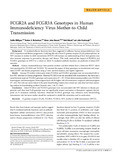| dc.description.abstract | Background. Fc-mediated effector functions have been suggested to influence human immunodeficiency virus (HIV) acquisition and disease progression. Analyzing the role of host Fc gamma receptor (FcγR) polymorphisms on HIV outcome in mother-to-child transmission (MTCT) will increase our understanding of how host genetics may alter immune responses in prevention, therapy, and disease. This study analyzed the impact of FCGR2A and FCGR3A genotypes on MTCT in a cohort in which Fc-mediated antibody functions are predictive of infant HIV outcome. Methods. Human immunodeficiency virus-positive mothers and their infants from a historical MTCT cohort were genotyped for FCGR2A and FCGR3A. We assessed the impact of these genotypes on transmission and acquisition of HIV and disease progression using χ2 tests, survival analyses, and logistic regression. Results. Among 379 mother-infant pairs, infant FCGR2A and FCGR3A genotypes were not associated with infant HIV infection or disease progression. Maternal FCGR2A was not associated with transmission, but there was a trend between maternal FCGR3A genotype and transmission (P = .07). When dichotomizing mothers into FCGR3A homozygotes and heterozygotes, heterozygotes had a 64.5% higher risk of transmission compared with homozygotes (P = .02). This risk was most evident in the early breastfeeding window, but a trend was only observed when restricting analyses to breastfeeding mothers (hazards ratio, 1.64; P = .064). Conclusions. Infant FCGR2A and FCGR3A genotypes were not associated with HIV infection or disease progression, and, thus, host FcγR genotype may not significantly impact vaccination or therapeutic regimens that depend on Fc-mediated antibody functions. Maternal FCGR3A genotype may influence early breastfeeding transmission risk, but more studies should be conducted to clarify this association and its mechanism. | en_US |

